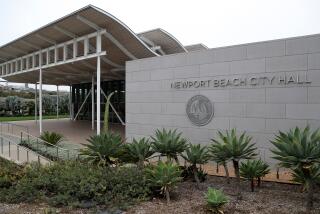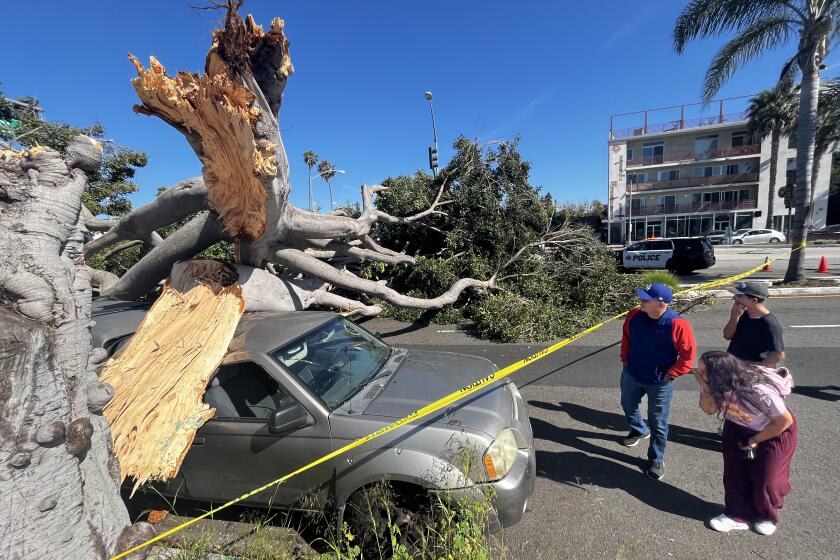Prop. 218 Cuts a Swath Through O.C. Budgets
Three months after voters overwhelmingly approved Proposition 218, a number of Orange County cities are bracing for drastic budget cutbacks caused by the loss of millions of dollars in property tax assessments.
Among the hardest hit cities are San Clemente, Stanton, Irvine, La Palma, Yorba Linda, Garden Grove and Tustin, which all rely on special assessment districts to pay for street lighting as well as maintenance of parks, beaches and other public properties.
The proposition prohibits cities from using assessment revenue for those purposes, and in some cases requires voter approval of levies already in place.
Implementation of Proposition 218 should result in smaller tax bills for some property owners. But city officials insist the tax breaks could come at the expense of basic municipal services.
“It’s real bad,” said San Clemente City Manager Michael W. Parness. “We are in crisis mode.”
Yorba Linda is considering asking voters in a June election to affirm their willingness to continue paying $4 million in existing assessments called in question by Proposition 218. If voters reject the levies, the city will somehow have to do without the revenue, which represents about 25% of its general fund budget.
In Stanton, officials said the loss of $600,000 in park maintenance funds could force deep cuts in police and fire services. To prevent that, the city will ask voters in June to approve a special law enforcement tax.
San Clemente officials are also considering a June tax initiative designed to cover $2.7 million in losses. City leaders said they are left with a menu of unattractive options, such as raising recreation fees, halting beach maintenance or laying off employees.
Other cities face less severe problems because they do not pay for maintenance and lighting through special assessment districts. But experts warn that all communities will have to contend with the long-term effects of Proposition 218.
Anaheim, for example, had its credit rating downgraded last month because a Wall Street rating agency concluded that the proposition will make it harder for the city to raise revenue to repay its debts in the future.
“Our fear is that the financial community will look at this along with the [county] bankruptcy as signs that people are unwilling to pay for the services they receive,” said Janet Huston, executive director of the Orange County Division of the League of California Cities. “That will have an effect on the bond ratings of all cities.”
Proposition 218 limits the ability of local governments to raise taxes and requires approval by property owners for a variety of existing assessments. It was sponsored by the Howard Jarvis Taxpayers Assn., authors of the landmark Proposition 13, which not only capped at 1% the property tax rates that could be imposed, but also rolled back appraised values to 1976 levels until a new value is set by an actual property sale.
Despite the grim scenarios being depicted by some city officials, supporters of Proposition 218 are demanding that government agencies implement the measure immediately.
Carole Walters, president of the Orange Taxpayers Assn., said city officials are exaggerating the impact of Proposition 218, which she said simply gives property owners a stronger voice in setting assessments and taxes.
“They always cry and complain, but the budgets get balanced in the end,” she said. “The voters demanded this, and they should get it.”
San Clemente: Angry Voters Got Their Wish
San Clemente’s gloomy predicament can be traced directly to a $7 tax increase adopted by the City Council last summer, local activists say.
The increase, to pay for maintenance at 40-acre Richard T. Steed Memorial Park, was tacked on to assessments levied by the city’s Lighting and Landscaping District, raising the bill to $93 a year per household. It was the district’s second increase in as many years, and it prompted angry voters to support Proposition 218 by a 67% margin but also to oust longtime council members Candace Haggard and Scott Diehl in the process.
“That was the straw that broke the camel’s back,” said Jim Hill, 73, a 13-year resident and city activist, referring to the increase. “People just said enough is enough.”
But troubled officials in this city of 47,000 people say the vote did more than make a statement about anti-tax sentiment. Under Proposition 218, the city is expected to lose about $2.7 million, or a whopping 14% of its general fund budget.
To make up for a weak sales tax base, the city since 1982 has used assessment districts to cover a variety of services, including beach and park maintenance and capital improvements. What began as a $15 annual assessment has risen to $93 over the years.
Now the post-Proposition 218 city must look at across-the-board cuts that strike at the heart of the quality of life in San Clemente, officials say. Everything in this 18-square-mile city--from recreation programs to senior services to lifeguard duties--must be considered.
This dismal scenario has also revived proposals for new parking meter fees, the privatization of the city’s water department and bringing back the San Clemente Police Department, disbanded a few years ago.
“I’ve got some staff people who are putting together proposals to wipe their own jobs out,” Parness said. “You can imagine the environment around here.”
Most city officials say some sort of tax measure to recoup the losses will have to be placed on the June ballot.
“I think you have to have some sort of tax on the ballot. It’s too huge an amount for the city to swallow,” Mayor Patrick M. Ahle said. “But that’s what 218 was intended to do, give people a say. The outcome of that vote will decide what kind of quality of life our residents enjoy.”
La Palma: ‘This Is a Big Hit’
La Palma is likely to lose $600,000 because of Proposition 218, which amounts to 10% of the small city’s operating budget.
“This is a big hit,” said City Manager Daniel E. Keen. “Our revenue structure in La Palma is a house of cards--it’s very fragile. What 218 does is take away some key revenue sources. So we have to rebuild the house of cards all over again.”
The assessment district invalidated by the measure pays for street lighting as well as maintenance of parks, traffic medians and City Hall. Because the services are so critical, city officials doubt they can simply stop performing them.
“I don’t think the residents want us to stop cleaning the parks, abandon our greenbelts and turn off the street lights,” Keen said.
The City Council is now studying other options, such as cutting elsewhere in the budget or somehow raising new revenue. Some have suggested the city could avoid cuts by simply tapping into its reserve account. But others aren’t so sure.
“I would feel very wary about using our reserves,” Councilwoman Charlene Hatakeyama said. “It’s important to have reserves in case of an emergency, and we worked so hard to build them up.”
Yorba Linda: Beloved Landscape Threatened
In Yorba Linda, Proposition 218 threatens to hit one of the city’s most beloved features: its attractive greenbelts, open spaces and traffic medians.
Years ago, Yorba Linda adopted the moniker “The Land of Gracious Living” and has worked to maintain a garden-like atmosphere. Miles of greenbelts with manicured lawns and perennial flowers are planted, watered and regularly mowed. Trees and shrubs are clipped and trimmed on a weekly basis.
The city spends $4.2 million each year, raised through assessments, keeping the town green.
Proposition 218 requires that the assessment be placed before the voters for approval. If the levies are voted out of existence, there is no way the city can find enough money in its budget to pay for landscaping, City Manager Arthur C. Simonian said.
“What is at stake here is the identity of the community,” he said.
(BEGIN TEXT OF INFOBOX / INFOGRAPHIC)
Binding Proposition
Here is how some cities will be affected by Proposition 218, the ballot initiative approved by voters last fall that severely limits the ability of local governments to raise taxes:
City: Garden Grove
Revenue Risk: $700,000
Impacts: Possible cuts in city services to make up for revenue loss.
*
City: Irvine
Revenue Risk: 3.1 million
Impacts: Hoping state Legislature will moderate affects of proposition; budget cuts possible.
*
City: La Palma
Revenue Risk: 600,000
Impacts: Service cuts or use reserves to cover shortfall, about 10% of budget.
*
City: San Clemente
Revenue Risk: 2.7 million
Impacts: Layoffs, service cuts possible; city might place new tax measure on June ballot.
*
City: Stanton
Revenue Risk: 600,000
Impacts: City will ask voters to approve new tax to cover losses; police, fire service cuts possible.
*
City: Tustin
Revenue Risk: 475,000
Impacts: Cuts possible in lighting, other services.
*
City: Yorba Linda
Revenue Risk: 4.2 million
Impacts: Sum equals about 25% of budget; city considering June election on existing assessments.
Source: Individual cities
More to Read
Start your day right
Sign up for Essential California for news, features and recommendations from the L.A. Times and beyond in your inbox six days a week.
You may occasionally receive promotional content from the Los Angeles Times.






